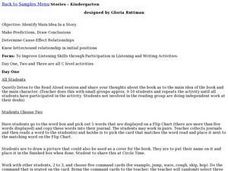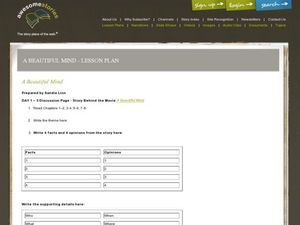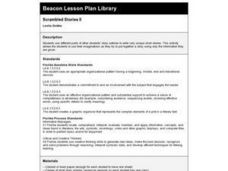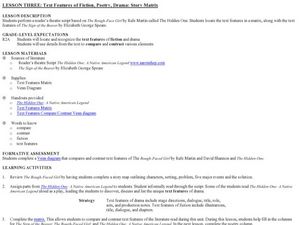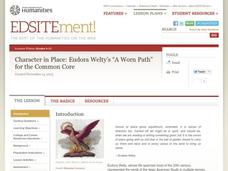Details Teacher Resources
Find Details lesson plans and worksheets
Showing 3,005 resources
K12 Reader
Narrative & Creative Writing Prompts
Narrative writing prompts challenge young writers to create stories. Along the way, they learn how to stretch their imagination, draw on personal experiences, organize the elements of a story, and add sensory details. The 11 prompts are...
Lesson Planet Curated
Tales from California’s Channel Islands: Dark Water
As part of their study of the history of the Channel Islands, class members watch Dark Water, a documentary about a traditional Chumash ceremony. The documentary launches a series of lessons about this tribal nation that inhabited the...
Core Knowledge Foundation
Different Lands, Similar Stories Tell It Again!™ Read-Aloud Anthology
A read-aloud anthology highlights how one story differs depending on where it comes from. Scholars listen carefully to familiar and new stories, participate in discussions, and complete word work practice. Extensions for each lesson...
Core Knowledge Foundation
Fables and Stories Tell It Again!™ Read-Aloud Anthology
A read-aloud anthology focuses on fables. Over three weeks, first graders listen to various stories and then participate in lessons that cover story elements, including plot, characters, setting, and personification and explore...
Curated OER
Printable Story Starter: The Get-Away
This fun, creative writing prompt invites young writers to continue the story of Boe and Tim, who discover a hot air balloon while escaping from their big sisters. The worksheet provides a space where learners can finish the middle and...
Curated OER
Chatty Cherry Stories
Young artists will respond to reading children's literature, by engaging in original storytelling and representing their own images through the visual arts. Then they orally describe details of people, places, and things in their stories...
Curated OER
Identify Main Idea in a Story
Help your kindergarteners identify the main idea in a story. Small groups work with the teacher to make predictions and draw conclusions. They are able to determine cause and effect relationships. The lesson is divided into several days,...
Curated OER
"The Story of an Hour" Lesson 4: Teacher's Guide and Notes
Learning how to summarize can be a challenge. Guide your writers through the process of summarizing a story using the children's tale; I Want My Hat Back for practice. Class members then use this "Somebody, Wanted, But, So, Then"...
Curated OER
Applying Ahimsa to Traditional Stories
Investigate the life of Mahatma Gandhi by researching non-violent lifestyles. Learners define the word ahimsa and discuss the personal characteristics that made Gandhi a peaceful warrior. They also create a poster about the story "The...
Curated OER
A Fantasy Story: Baby Bear's Space Journey
Give this literacy worksheet to your beginning readers to help them draw out key details and retell in their own words. They read a short fantasy story about a bear in space which includes dialogue, onomatopoeia, and a simple story line....
Curated OER
Dream Catcher Story Web
A well-designed graphic organizer which should help young readers capture the important details of a story is here for you. In it, learners fill in boxes that capture the introduction, beginning, details, and conclusion of the story.
Curated OER
A Beautiful Mind: Main ideas and supporting details
This worksheet that accompanies a reading of A Beautiful Mind includes over 20 questions that address theme, fact and opinion, supporting details, characterization, and quote comprehension.
Curated OER
Comparing Two Stories
Compare new and old versions of the classic story Alice in Wonderland in this comprehensive worksheet packet. Learners read an excerpt from the original, answering several analysis questions. They do the same for a more modern version,...
Curated OER
Scrambled Stories II
Review story elements with your class. They will use examples from a story to develop critical-thinking questions. Then they use a graphic organizer to describe the setting, character, and plot of the story, focusing on how they...
Curated OER
Making A Story Map
Sixth graders learn to plan a story by using a story map. They analyze a detailed sample story map and answer 5 questions about it. Then, plan their own story using a story map template.
Curated OER
Lesson: A Picture is Worth a Thousand Words: Attention to Detail
After a quick warm up activity, learners get ready to use their keen observation skills to examine an ornate Japanese pencil box. They discuss the artistry, skills, and story of the box, paying close attention to details. They then...
Scholastic
Spin-a-Story: Writing Prompts Chart
"But I don't know what to write about!" Now, there's a very familiar complaint. And here's a very creative solution. Young authors are given a writing prompt chart, spin three wheels that provide suggestions for the who, what, and where...
Curated OER
Story Elements that Support the Theme
Three great graphic organizers guide readers to see how the elements of plot and main idea can be charted to reveal the theme of a story. Model the process on the provided Direct Teaching Teacher Graphic Organizer using Aesop’s The...
Curated OER
Which Story Matches the Given Theme?
Model for young learners how to determine the theme of a story. Read aloud Aesop’s The Fox and the Stork. Chart the plot and the main idea of the fable, showing class members how these elements support the theme. Fable titles for guided...
Curated OER
Text Features of Fiction, Poetry, Drama: Story Matrix
How do novels differ from plays? Explore with your class the text features of fiction and drama by reading The Hidden One: Native American Legend and then performing a reader’s theater script based on the story. Class members create a...
Curated OER
“The Story of an Hour” Extension Activities: Teacher’s Guide and Notes
Enhance and extend instruction of "The Story of an Hour" by Kate Chopin with one or all of these ideas. You might want to cover characterization and summary, or improve understanding of context clues and irony. You can cover any...
Curated OER
We of the Sea: Tribal Native American Stories
A video featuring members of Oregon’s Astoria Native American fishing community launches a study of the oral tradition of poetry, and how traditions are passed down within different cultures. Activities, assessments, extensions and...
National Endowment for the Humanities
Character in Place: Eudora Welty’s “A Worn Path” for the Common Core
How do writers use the interaction between elements like characterization and setting to create meaning? Readers of "A Worn Path" create a series of comic book-style graphics of Eudora Welty's short story and reflect on how Welty uses...
Olathe Public Schools
Topic, Main Idea, Supporting Detail, and Theme
Get your class members thinking about a reading passage's topic, main idea, supporting details, and theme with this interactive presentation that asks scholars to define, locate, and review each term.








